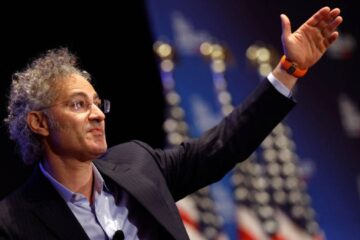The 2024 election is less than a week away, and it’s anyone’s guess who’ll be voted president on Nov. 5: Democratic incumbent Vice President Kamala Harris or Republican 45th president Donald Trump.
While millions of Americans will go to the polls, one particular group holds particular financial, social, and corporate influence: chief executive officers (CEOs) of publicly traded companies.
CEOs can help to dictate a company’s agenda, whether that involves supporting a government policy that protects American business interests abroad, advocating for initiatives that promote diversity and inclusion, or promoting political candidates who promise corporate deregulation.
💸💰 Don’t miss the move: Subscribe to TheStreet’s free daily newsletter 💰💸
Do CEOs tend to be Republicans or Democrats?
In a study sponsored by Harvard Law School, scholars wrote that “public-company CEOs are likely to have a disproportionate influence over American policymaking and politics, and understanding their political preferences is therefore important for understanding the inner dynamics of the U.S. democracy.”
This empirical study, which covered 3,800 individuals who served as CEOs of Standard and Poor’s 1500 companies over an 18-year period from 2000 to 2017, showed that CEOs were more likely to donate to the Republican Party and its candidates. Of the CEOs included, 57% identified as Republicans, 19% as Democrats, and the remainder as neutral or unknown.
Taxes: The big-ticket political issue among CEOs
In general, leaders of large companies tend to lean toward politicians who favor a lower corporate tax rate. In 2017, Trump lowered the corporate tax rate to 21% from 35%, and if elected in 2024, he would likely continue to maintain low corporate tax rates as well as low tax rates for the wealthy. That’s an incentive embraced by many CEOs of the biggest publicly traded companies.
Jensen Huang, founder and CEO of AI chipmaker Nvidia Corp. (NVDA) , wouldn’t say which presidential candidate he supported, but told CNBC in an interview, “Whatever the tax rates are, we’ll support it.”
Related: 5 high-profile hedge fund founders & their political affiliations
Some CEOs, such as Elon Musk of Tesla (TSLA) , are also among America’s wealthiest billionaires, and Harris is campaigning for billionaires to pay their fair share in income taxes. While some prominent CEOs were vocal and supported Democratic candidates in past presidential elections, many have remained silent or neutral this time around.
In September, Harris’s campaign released a list of more than 90 business leaders who endorsed her presidential run. The list, though, didn’t include many CEOs of big companies. The support included many former CEOs who were at the helm of some of the biggest names in the corporate world — such as Time Warner, Xerox, and Ford Motor (F) — but whose influence in the companies they presided over has since diminished since stepping down.
The following are a few CEOs who have made it at least somewhat clear where their political affiliations lay — or are staying neutral.
Note: Net worth data comes from the Bloomberg Billionaires Index.
Elon Musk is the wealthiest person in the world, with a net worth of $270 billion.
Elon Musk
CEO: TeslaNet worth: $270 billionTesla’s market capitalization: $822 billion
Elon Musk, the wealthiest person in the world, is inarguably one of the most popular and polarizing CEOs in the United States. He is also one of the most politically active CEOs, in helping to promote Trump’s candidacy in the 2024 presidential election. He’s participated alongside Trump in his campaign and has contributed tens of millions of dollars in financing.
With a net worth of $270 billion, Musk — who, in the past, has supported Democratic candidates — has the financial resources to help bolster Trump’s campaign. So far, he’s put more than $118 million into America Pac, a super PAC that focuses on Trump’s election and mobilizing votes in crucial swing states, according to OpenSecrets, a group that tracks money and politics.
By supporting Trump to secure the role as the nation’s 47th president, Musk likely hopes for a near future with less federal regulation in business.
Stephen Schwarzman has a net worth of $54 billion.
Stephen A. Schwarzman
CEO: BlackstoneNet worth: $54 billionBlackstone’s market capitalization: $210 billion
Stephen A. Schwarzman is CEO of Blackstone (BX) , the largest listed private equity firm that oversees more than 230 portfolio companies with almost 700,000 employees.
Schwarzman’s support of Trump’s presidency goes back to 2016, and he continues to back Trump’s run for office in 2024. His support stems from his belief that under the Biden administration “our economic, immigration and foreign policies are taking the country in the wrong direction.”
According to OpenSecrets data, Schwarzman spent more than $125 million on the Republican Party and its candidates in 2024.
Jamie Dimon has a net worth of $2 billion.
Jamie Dimon
CEO: JPMorgan ChaseNet worth: $2 billionJPMorgan’s market capitalization: $642 billion
Jamie Dimon is CEO of JPMorgan Chase & Co. ( (JPM) ), the biggest bank in the U.S., and he has personally supported Democratic candidates in the past. This time around in 2024, he has kept a low profile and hasn’t publicly endorsed any presidential candidate. Reports have suggested that he supports Harris, and that if she were to be elected president, Dimon may want to pursue a role in her administration, specifically as secretary of the U.S. Department of the Treasury. Even Trump has hinted at Dimon as Treasury secretary in his administration, per reports.
Related: Jamie Dimon’s net worth: Base pay, incentives & billionaire status
In a memo to employees in June 2024, he reportedly encouraged JPMorgan employees to contribute to the bank’s PAC, known as the JPMC PAC, which contributes to both Republican and Democratic candidates running in the general election.
Warren Buffett has a net worth of $143 billion.
Warren Buffett
CEO: Berkshire HathawayNet worth: $143 billionBerkshire Hathaway’s market capitalization: $983 billion
Warren Buffett built a fortune by investing in companies for his holding company, Berkshire Hathaway (BRK.A) . While he has proclaimed himself a Democrat and advocated policies that would make wealthy Americans pay a higher percentage of their income in taxes, he has also described himself as “a card-carrying capitalist.”
While he has voted for Democratic presidential candidates in the past, he has endorsed neither Republican nor Democratic candidates in the 2024 vote. He also refrained from endorsing candidates in the 2020 election.
CEO net worths:
Mark Zuckerberg’s net worth: What the Facebook founder makes as CEO of MetaTim Cook’s net worth: How much the Apple CEO’s stock is worthWhat is Warren Buffett’s net worth: How the Birkshire Hathaway founder made his billions
What have other CEOs been doing in this election?
Among the biggest names in tech and other publicly traded companies, the CEOs of Apple (AAPL) (Tim Cook), Meta Platforms (META) (Mark Zuckerberg), and Alphabet (GOOGL) (Sundar Pichai) have largely taken a low-key stance toward the 2024 election, rather than vocally endorse either presidential candidate.
Hedge fund chiefs, on the other hand, have been more vocal, and have made their political preferences clear via their donations to various political action committees (PACs).
Jeff Bezos has a net worth of $213 billion.
Chip Somodevilla/Getty Images
While Jeff Bezos — with a net worth of $213 billion — is no longer CEO of Amazon (AMZN) , he still maintains some control over the company he founded as its executive chairman. As owner of the Washington Post, he typically isn’t involved in the newspaper’s affairs.
However, the Post has broken away from tradition by no longer endorsing any candidate for president in the 2024 election, and that has drawn criticism from Democrats but praise from Republicans. This followed the Los Angeles Times’ withdrawal of a planned endorsement for Harris, which was blocked by its owner.
The Post — which was drafting an endorsement for Harris before the withdrawal — had endorsed a Democrat in presidential elections going back to 1976.
Related: Veteran fund manager sees world of pain coming for stocks


